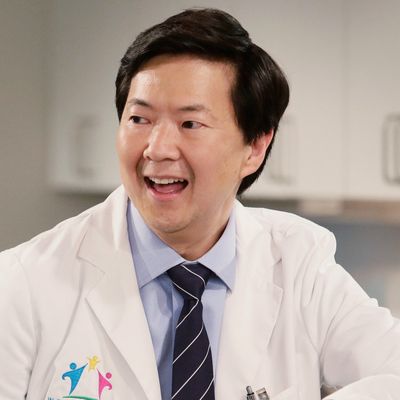
Here’s hoping Ken Jeong is a better doctor than he is a sitcom creator, because holy lord, Dr. Ken — inspired by the fact that Jeong is, in fact, an M.D. — is a dud. It’s a show that confuses loudness with funniness. Jeong himself screams every line, and the studio audience howls back, particularly when Jeong does his faux-rapper voice. It’s crass and phony, and everything people say they hate about multi-camera comedies (staged, in front of a studio audience). The pilot’s first beat revolves around a patient who may or may not have hemorrhoids. The word hemorrhoid is said several times, ostensibly to comic effect. This opening scene could have been about anything. It could have found a way to entice viewers, or delight us, or engage us, or scandalize us, or impress us, or inspire us, or educate us. Instead, it’s “hemorrhoid” nine times and some material about colonoscopies. There are so many glorious options, and yet Dr. Ken decided on this.
Oh, for better roles for this cast. Suzy Nakamura is stuck in the thankless wife role; Albert Tsai is the quirky son, but really just a watered-down rehash of the role he played already on the vastly superior Trophy Wife — RIP; Dave Foley is Dr. Ken’s too-blond boss; Jonathan Slavin (Better Off Ted) is one of the nurses in his office; Tisha Campbell-Martin is another. How do you get all these people together and say, “Let’s make something unimaginative, unfunny, often mean-spirited, and emotionally bankrupt”?
Multi-camera comedies get a bad rap these days. But the problem isn’t the format, it’s the content. There are plenty of brittle single-camera comedies, too. But multi-camera comedies’ sins feel exaggerated because of how forceful the pace is: We can’t breeze past a rancid joke but instead have to watch someone more or less plant their feet, belt out the punch line, and then wait for the aftershocks to settle down. This works fine when that punch line is good, or when we want a certain kind of distance from the material (say, with Carla’s one-liners on Cheers, which, in a more naturalistic setting, would seem sociopathatic). When the jokes aren’t good, or the delivery is exhausting, or the whole idea of wanting to watch television is somehow strained by the enterprise, the multi-camera format might as well be a magnifying glass.
That is not a flattering lens for Dr. Ken. Better to look away completely.




